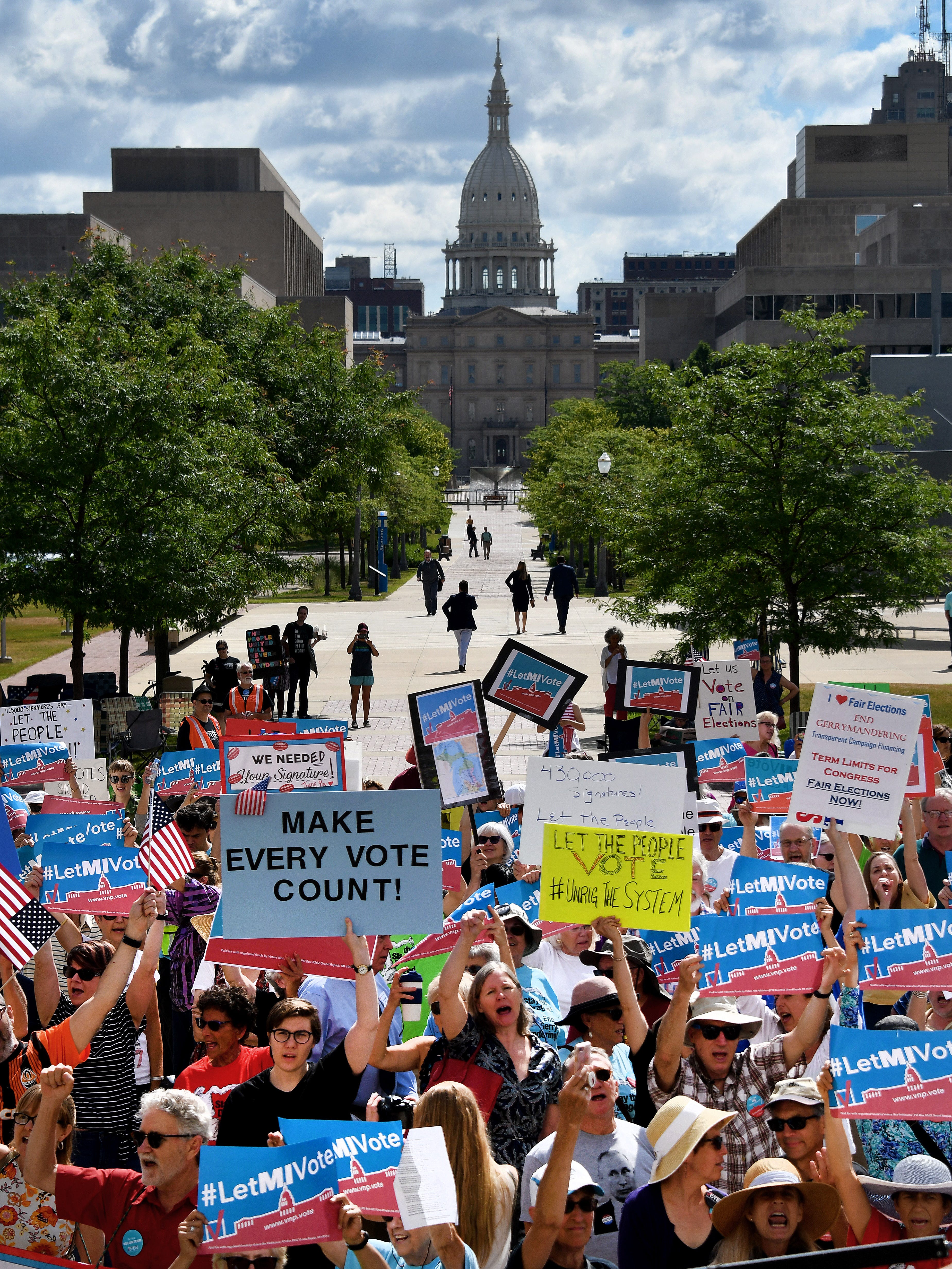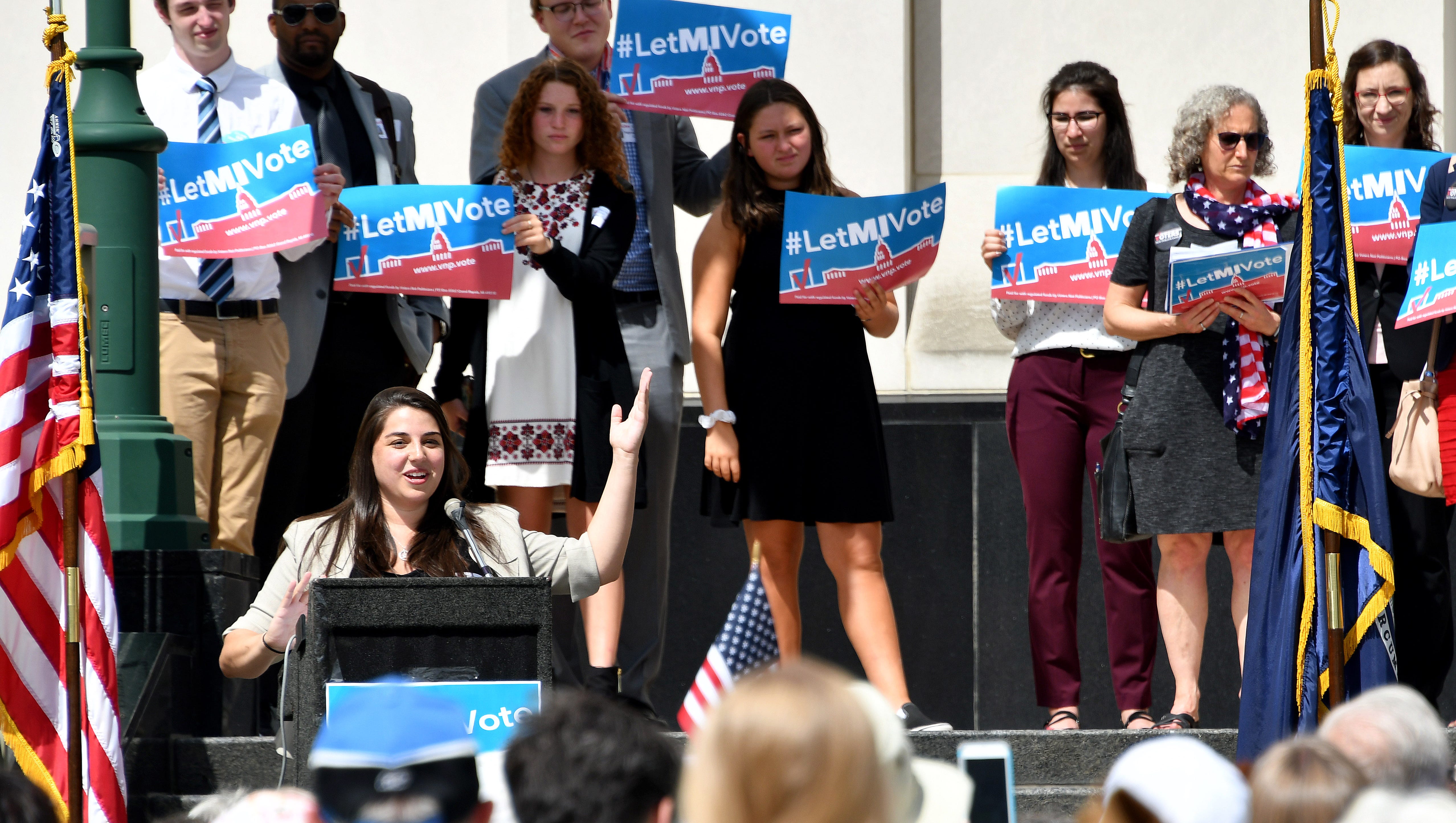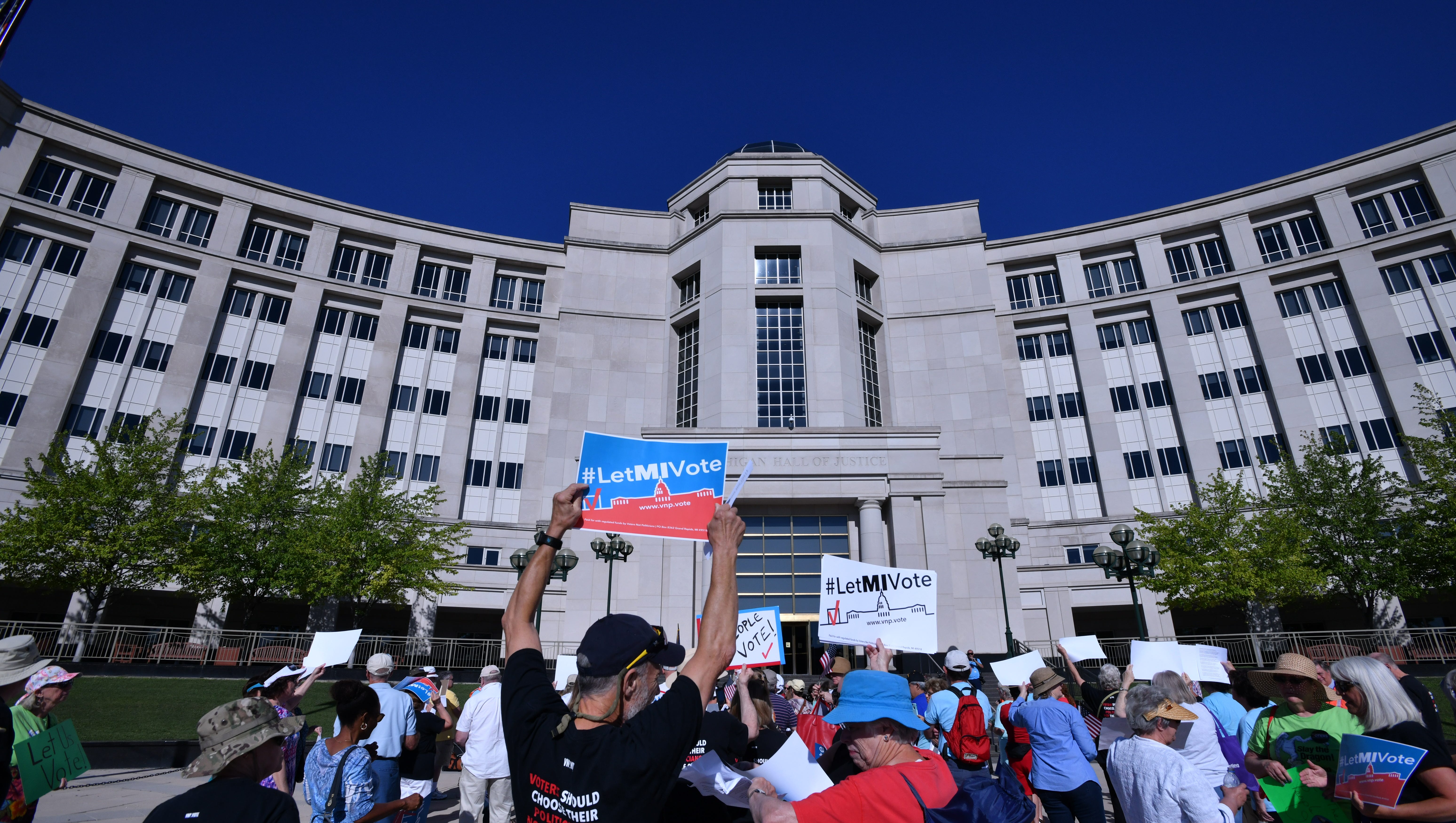Foes, fans take redistricting fight to Michigan Supreme Court

Lansing — Redistricting reform supporters rallied Wednesday outside the Michigan Supreme Court as the justices heard arguments about whether voters this fall should decide the high-stakes plan to let an independent panel draw political boundaries.
The redistricting commission ballot proposal — which practically exempts itself from judicial oversight — is the kind of "sweeping, radical change" that could only be achieved through a constitutional convention, opposition attorneys told the high court.
Lawyers for Citizens Protecting Michigan's Constitution and Attorney General Bill Schuette's office argued the proposal constitutes a revision — rather than an amendment — to the state Constitution and should be kept off the November ballot. Volunteers gathered nearly 400,000 valid signatures in an attempt to put the plan before voters.

Attorneys for the Voters Not Politicians ballot committee told the seven justices the measure is an amendment because it has a singular purpose: to reform the way legislative and congressional maps are drawn every decade. It would create an independent commission to take over a task now controlled by whichever political party holds power in Lansing — most recently Republicans in 2011.
The justices heard nearly one and a half hours of oral arguments during a special session called to hear a case fraught with political implications. Supporters of the proposal, who contend it would curb "gerrymandering," rallied outside the Hall of Justice, chanting "let the voters decide."
The Michigan Secretary of State's Office is asking the high court to rule by early August. Ballots for the November election must be certified by Sept. 7. The court is "working diligently with a goal of deciding the case by the end of the term," which is July 31, said spokesman John Nevin.
Justices on the 5-2 GOP majority court appeared to wrestle with textual arguments over the Michigan Constitution. What is an amendment? And without a clear definition in the Constitution itself, what test or precedent should the court use to determine whether a proposed amendment is focused on a single purpose or makes broad and fundamental changes?
The proposal, which would add more than 3,000 words to the Michigan Constitution and change or strike 11 separate sections, "is anything but short and simple," said Peter Ellsworth, an attorney for the opposition group bankrolled by the Michigan Chamber of Commerce.
"It would create a super agency combining the executive, legislative and to some extent judicial branch with virtually no checks and balances," he said of the proposed commission. "This agency would be responsible to nobody but itself."

Chief Justice Stephen Markman offered a similar assessment but appeared reluctant to create or adopt any test for ballot access that could be applied to proposed amendments in the future.
The proposal "substitutes 13 citizens chosen at random across the state by a procedure that's not entirely random and it interposes that process in place of one in which 10 million people" have a say in the process through their elected officials, Markman said.
But attorney Graham Crabtree, representing Voters Not Politicians, noted that voters never gave lawmakers that authority. Michigan's 1963 Constitution created a bipartisan redistricting commission that was later deemed inoperable by the state Supreme Court because of criteria that conflicted with federal law.
A ballot proposal "can amend several sections of the Constitution and it can be long and involved as long as it addresses a single purpose or subject and as long as all the changes made are germane to that purpose," Crabtree argued.

Justice David Viviano, first appointed to the bench by Republican Gov. Rick Snyder in 2013, pointed out that Michigan's Constitution gives voters the right to direct democracy by creating a path to initiate laws, amendments or referendums.
The high court can enforce limitations on that right, as it did in a 2001 case prohibiting referendums on laws that contain appropriations, but "I'm struggling to find a similar express limitation in this case," Viviano said.
As Markman pressed attorneys on how to determine whether a proposed amendment has a singular subject, Viviano suggested Markman might be making the case that "this court shouldn't be involved in this at all because we can't come up with a test."
Solicitor General Aaron Lindstrom, representing Schuette's office, argued the redistricting commission proposal is a general revision to the Constitution. Voters have two paths to change the Michigan Constitution, he said, and a revision requires ratification at convention.
"The fact that it's not a bright line rule doesn't mean that it's not this court's job to enforce it," Lindstrom said. "There is a difference between three and two."
Both Democratic-nominated justices challenged arguments from the attorney general's office, suggesting that tossing the measure from the ballot would take away the ability of voters to decide its fate.
"It just surprises me your office would take a stance that would be so against people," said Justice Richard Bernstein, who questioned the feasibility of creating an independent commission through a constitutional convention, which voters are automatically asked about every 16 years.
"Why does the Constitution give seven of us a judicial veto over something the people have decided they want to vote on?" asked Justice Bridget Mary McCormack.
A three-judge Michigan Court of Appeals panel unanimously rejected the opposition arguments in June, but that decision was quickly appealed to the Michigan Supreme Court.
The potential ballot proposal is “narrowly tailored” to create a 13-member redistricting commission that would be comprised of four Democrats, four Republicans and five independent members who are not affiliated with any major political party, the appeals court panel said.
More than 100 people gathered for a rally outside the Hall of Justice during the hearing, voicing their support for the redistricting proposal being argued inside. The group included speakers from Voters Not Politicians, the Sierra Club, League of Women Voters and the NAACP.
Voters Not Politicians Executive Director Katie Fahey greeted supporters as she made her way to the courtroom with a documentary crew in tow Wednesday morning.
“I think for so many of us, there’s been thousands of people that made this a reality, it’s nice to be a part of it, to be able to come and see how our justice system works, to then get the assurance that we will be on the ballot Nov. 6,” she said.
For Terrance Cox, Wednesday was an opportunity to dip into politics in Lansing. She moved from Carrollton, Texas to the Lansing area in October to be closer to her grandson and her daughter, Davia Downey, who is on the board for Voters Not Politicians.
“The issue is very simple,” Cox said. “Draw the lines where they should be drawn, not where the politicians want them to drawn.”
The redistricting ballot petition was the first petition for which Gail Vettraino has gathered signatures. The retired teacher from Lake Orion said the issue affected the “basis of democracy.”
“It’s really hard to believe that in American the voice of the people doesn’t count, that there are ways to get around what the people really want,” Vettraino said.
The closely watched case has major political implications in Michigan, where Republicans wrote the current political maps in 2011 and could do so again in 2021 if they retain control of the state Legislature.
Democrats haven’t formally endorsing the proposal but regularly complain about alleged GOP “gerrymandering,” and the state party’s former chairman is the lead attorney in a separate federal lawsuit challenging the fairness of the current maps.
Wednesday's hearing featured "thoughtful, substantive and vigorous debate on both sides," said Rich Studley, president and CEO of the Michigan Chamber, whose members have faced personal criticism over the chamber's participation in the case.
"We’re back where we should be with a respectful debate, a civil debate between Michiganders about what our state Constitution means," Studley said. "This is the way the process is supposed to work. Every Michigander has their right to a day in court, and we look forward to their decision."
Justices Kurtis Wilder and Beth Clement, appointed to the bench by Gov. Rick Snyder in 2017, are up for election this fall. Neither spoke during Wednesday's hearing. They're expected to seek nomination at the Michigan Republican Party convention but do not need it to qualify for the ballot as incumbents.
joosting@detroitnews.com
(517) 371-3662